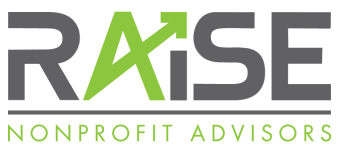This article was originally posted in The Jewish Link of New Jersey.
Any reader of this paper will take note of the many wonderful causes at work in our community; one could fill his or her dance card each week attending events in support of the organizations advertised in these pages. In other words, one might be amazed at how many organizations in our community are seeking support.
The nonprofit sector has grown by 17 percent in the last decade, and organizations need tools, tactics and strategies to compete for the funding they require to achieve their missions.
The Jewish Link asked Rachel Cyrulnik, founder and principal at the newly launched fundraising consulting firm RAISE Nonprofit Advisors, and Teaneck resident, about nonprofit trends and why she felt inspired to launch her new firm.
Fundraising is something that many people find uncomfortable or even distasteful. Why did you choose a career in it?
Jerry Seinfeld has an entertaining bit where he questions people’s aversion to public speaking, quoting a study that pegged public speaking as a number one fear. If that is people’s top fear, he jokes, seconded by death, your average person would rather be the guy in the casket rather than the one delivering the eulogy!
I would posit that fundraising ranks high on the list of fears, perhaps even surpassing public speaking. In my 15 years of working with nonprofits as a professional and lay leader, I’ve very frequently encountered a deep-seated discomfort with the idea of asking other people for money. But why? Enabling the sacred work of an organization with a noble mission is one of the most meaningful and empowering experiences one can have. And the health benefits of giving are proven. Yet, statistically speaking, with the exception of natural disasters, people don’t really give without being asked. Fundraisers fill this need—it is their job to educate people about philanthropy, push them to give thought to their generosity and inspire them to make an impact.
I’ve worked as a development professional at UJA-Federation of New York and Yeshiva University. I’ve worked with dozens of organizations as a consultant and as a board member in my local school and shul. Over my career, I’ve had the opportunity to secure tens of millions of dollars for good causes. Nothing else would give me more professional fulfillment.
Why did you launch RAISE Nonprofit Advisors?
I saw the opportunity to impact an increasingly challenging development landscape—there is more competition than ever, donors’ mindsets about giving and what drives their philanthropy have changed, and development offices are struggling to identify what their priorities should be and how to successfully execute on those priorities to achieve results.
RAISE Nonprofit Advisors was founded to help nonprofits address these realities. Our pioneering approach to fundraising combines data analysis and project management to identify opportunities, set strategy and accomplish goals.
RAISE’s most valuable asset is its team of development experts who are strategically deployed to deliver on our goals by sharing their vast range of expertise, including organizational fundraising with significant endowment and capital experience, marketing/communications, data analytics, foundation and government grants and project management. Each member of our team possesses 10 to 20 years of development experience, both on the ground as nonprofit professionals and as consultants. We work almost exclusively with Jewish nonprofits and have deep understanding of and experience with day schools, synagogues and community organizations. Our team members have worked with dozens of nonprofits on strategic campaign planning and execution for annual, endowment and capital campaigns; on strategic development planning; and on coaching and mentoring development professionals.
How do you help organizations raise money?
We look at the story their data is telling: Where are the opportunities? Where are the gaps that can be developed? For example, an organization securing reliable annual gifts can be thinking about endowments. An organization with several years of alumni can be learning about their interests, building relationships with them and engaging them in giving. An organization with many mid-level gifts can realize higher donations with the right cultivation strategy and connectors.
We build a plan informed by quantitative and qualitative information, the full picture of an organization’s history and work, and then help the organization stay the course with the use of 21st-century project management tools and hands-on counsel.
What are the biggest challenges facing Jewish nonprofits today?
A few major challenges come to mind.
First, audience apathy—trying to motivate and mobilize a tech-focused audience that is also being targeted by dozens of other nonprofits is not easy. In a world of instant gratification and mobile relationships, nonprofits can offer donors real meaning in their lives – if they can get through to them.
Second, insufficient data—one of my favorite quotes is “without data, you’re just another person with an opinion.” Gathering and managing data is time-consuming for under-resourced nonprofits, but decision-making without it is like taking a stab in the dark—it is an irresponsible way to utilize community dollars.
Another challenge is donor interest in directed giving when many causes need core operating support to fulfill their missions. Nonprofits must find ways of making unrestricted giving tangible and meaningful for donors.
Finally, impact—increasingly donors don’t just give to an organization furthering a cause they care about or have a connection to, they give to one that delivers results. The burden is on the nonprofit to make the case to the donor that by making a gift, the donor is successfully fulfilling his or her own philanthropic priorities.



